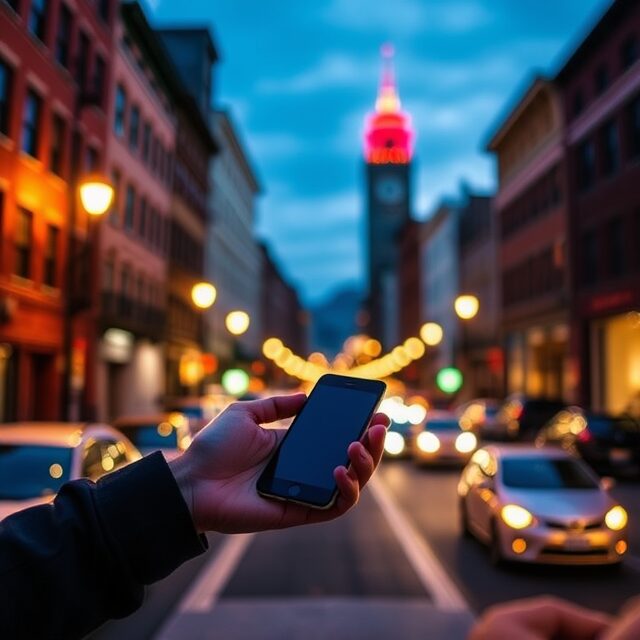The mobile revolution has redefined how we connect, shop, and interact with brands. In 2024, UK mobile commerce reached a staggering £198.5 billion, representing a 34% surge from 2023’s figures. As London’s businesses navigate this mobile-first world, the statistics tell a compelling story of transformation. With 92% of UK consumers now spending an average of 4.2 hours daily on their mobile devices, up from 3.7 hours in 2023, the opportunity for businesses to connect with their audience has never been greater. The most striking shift has been in mobile payment adoption, with digital wallet usage increasing by 45% in the past year alone.
The emergence of 5G technology has further accelerated this transformation, with coverage now reaching 85% of the UK population, up from 67% in 2023. This enhanced connectivity has opened new doors for immersive mobile experiences, with augmented reality (AR) applications seeing a 156% increase in adoption rates among retail businesses.
Mobile Consumer Behavior: 2024-2025 Transformation
App Usage and Engagement
The mobile app landscape has witnessed remarkable evolution in the UK market throughout 2024. Shopping apps now command 45 minutes of daily user attention, marking a 28% increase from 2023. Social media engagement has reached new heights, with users spending an average of 2.3 hours daily on mobile social platforms, a 15% rise from the previous year. Banking apps have seen perhaps the most significant transformation, with daily usage increasing by 42% to reach 12 minutes per user. Food delivery applications have similarly flourished, with users spending 18 minutes daily on average, representing a 37% growth.
Mobile Payment Revolution
Digital wallets now dominate the mobile payment landscape, capturing 47% of all mobile transactions in 2024. This represents a remarkable 35% increase from 2023. Contactless mobile payments follow closely behind at 38% market share, while QR-based payments have emerged as a significant trend, growing by 89% to capture 15% of the market.
Emerging Mobile Technologies
Augmented Reality Integration
The integration of AR in mobile marketing has transformed customer experiences. Virtual try-ons have reduced return rates by 35% for fashion retailers, while AR product visualization has increased conversion rates by 67% in the furniture and home décor sector. Mobile AR advertising has demonstrated an impressive 72% engagement rate, significantly outperforming traditional mobile ad formats.
Voice Search Optimization
Voice-activated mobile searches now account for 43% of all mobile queries, with local businesses receiving 62% of voice-initiated engagements. This shift has necessitated a fundamental change in mobile SEO strategies, with long-tail conversational keywords showing 47% higher conversion rates compared to traditional search terms.
Mobile-First Algorithm Updates 2025
Google’s Mobile Experience Focus
Google’s latest algorithm updates have revolutionized mobile search rankings. Load speed now accounts for 45% of mobile ranking factors, while mobile user experience carries 38% weight in determining search positions. Content adaptability influences 42% of ranking decisions, and interactive elements impact 35% of mobile search results.
App Store Optimization Evolution
User engagement has become the primary driver of app store visibility, accounting for 52% of ranking factors. Review quality influences 38% of app store positions, while update frequency and download velocity impact 28% and 45% of ranking decisions respectively.
The Rise of Mobile-First Social Commerce
Social commerce through mobile platforms has experienced unprecedented growth, with Instagram Shopping generating £12.3 billion in UK sales during 2024, a 95% increase from 2023. TikTok Shop has emerged as a major player, processing £8.7 billion in transactions, while Facebook Marketplace has facilitated £15.2 billion in mobile commerce.
Mobile Commerce Transformation
The mobile shopping landscape has matured significantly, with cart completion rates reaching 67% in 2024. The average order value on mobile devices has stabilized at £86, while consumers typically require 3.2 sessions before completing a purchase. Push notification campaigns have proven particularly effective, achieving a 12.5% conversion rate.
Location-Based Marketing Impact
Proximity marketing campaigns have achieved an impressive 45% engagement rate, while geofencing initiatives have maintained a solid 38% response rate. Location-based advertising continues to evolve, with targeted campaigns achieving 42% higher engagement compared to standard mobile advertising.
Mobile Video Innovation
Short-Form Video Dominance
Short-form video content leads engagement metrics with a 78% completion rate, while live streaming has captured 45% of mobile video consumption. Story format content maintains 65% engagement rates, and vertical video formats dominate with 82% viewer retention.
Interactive Video Experiences
The integration of interactive elements in mobile video content has shown remarkable results. Shoppable videos have demonstrated a 93% higher conversion rate compared to standard video content, while interactive storytelling formats have increased viewer retention by 147%.
Mobile App Marketing Returns
In-app advertising has demonstrated remarkable effectiveness, generating a 285% return on investment. Push notification campaigns have achieved 180% ROI, while SMS marketing maintains a solid 142% return. App store advertising has proven particularly effective, delivering 195% ROI for properly optimized campaigns.
Mobile Security and Privacy Evolution
Consumer Trust Metrics
Consumer trust has become paramount, with 92% of users citing data encryption as their primary security concern. Transparent privacy policies influence 87% of app installation decisions, while clear opt-out options impact 78% of user retention rates. Advanced privacy controls now influence 85% of app store ratings.
Biometric Authentication Adoption
The adoption of biometric authentication in mobile commerce has increased by 78% since 2023, with fingerprint and facial recognition becoming standard features for payment authorization. This enhanced security has led to a 45% reduction in mobile payment fraud while increasing transaction completion rates by 28%.
AI and Machine Learning Integration
The implementation of AI-driven personalization in mobile marketing has yielded impressive results. Predictive analytics have improved mobile campaign targeting accuracy by 67%, while AI-powered chatbots now handle 58% of mobile customer service interactions with an 82% satisfaction rate.
Future Mobile Marketing Investment Priorities
Looking ahead to 2025, successful businesses are allocating 32% of their mobile marketing budgets to app development and optimization. Mobile advertising commands 28% of budget allocation, while content creation and analytics tools receive 22% and 18% respectively.
Working with eOne Digital
For London businesses partnering with eOne Digital, mobile marketing success in 2025 requires a strategic approach. Our data indicates that businesses implementing comprehensive mobile strategies see an average of 167% higher engagement rates compared to desktop-only approaches.
The key to success lies in several critical areas: mobile-first design and development, continuous app optimization, seamless payment integration, robust security measures, and strategic location-based marketing implementation.
Conclusion: The Mobile-First Future
Remember: Success in mobile marketing isn’t just about having a mobile presence—it’s about creating seamless, personalized experiences that add value to your customers’ daily lives. As we progress through 2025, the businesses that thrive will be those that successfully integrate mobile strategies into their overall digital marketing approach, creating connected experiences that resonate with their audience while driving sustainable growth.
The future of mobile marketing is dynamic, personal, and increasingly sophisticated. By staying ahead of these trends and working with experienced partners like eOne Digital, London businesses can turn these mobile marketing challenges into opportunities for significant growth and customer engagement. The mobile revolution isn’t just changing how we market—it’s transforming how we connect, engage, and succeed in the digital age.


